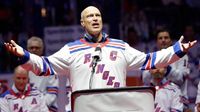Mark Messier, the legendary New York Rangers captain and current ESPN analyst, has voiced his concerns regarding the team's disappointing season, suggesting a five-step plan to restore the franchise's competitive spirit. Following the Rangers' elimination from playoff contention after a 7-3 loss to the Carolina Hurricanes on April 12, 2025, Messier's insights have resonated with fans and analysts alike.
The Rangers, who had high hopes after winning the Presidents’ Trophy last season, have struggled this year, leaving fans and experts questioning what went wrong. Messier, who is known for his leadership both on and off the ice, believes the team is lacking the spirit that characterized their previous success. "The spirit was missing this year for whatever reason," he stated during an ESPN broadcast.
Leah Hextall, reporting from the rink during the game against the Hurricanes, echoed Messier's sentiments. She described the atmosphere on the Rangers' bench as "almost church-like," highlighting a stark absence of energy and enthusiasm among the players. This observation raises concerns about the team's morale, especially as they faced the prospect of being eliminated from playoff contention.
Messier's five-step plan begins with the critical need to identify a new captain and leader for the team. He emphasized that leadership is essential for any team looking to succeed. "The number one thing that I think they need to think about is identifying a captain and a leader," Messier said. He pointed out that it has been since 1971, when Johnny Bucyk led the Boston Bruins, that a team won the Stanley Cup without a captain. The Rangers have not had a designated captain since Jacob Trouba was traded to the Anaheim Ducks in December, and Messier believes this leadership void has contributed to the team's struggles.
In addition to leadership, Messier highlighted the importance of creating a team identity. He noted that the Rangers found their identity last season but have since lost it due to disruptive trades and inconsistent performances. "You’ve got to create the identity of how you’re gonna play. All that’s gone and disappeared," he explained.
Building a strong team culture is another key element of Messier's plan. He argued that defining a core group of players to drive that culture is crucial. "You gotta define the nucleus to drive the culture," he said, lamenting the disruption caused by trades that have affected the team's cohesion.
Messier also advocated for a youth movement within the organization, suggesting that younger players should be given more significant roles. "You gotta keep pushing the youth up," he stated, emphasizing the need to transition from veteran players who may be nearing the end of their careers to a new generation of talent.
Finally, Messier addressed the issue of body language, which he found lacking throughout the season. He believes that implementing the first four steps will naturally lead to an improvement in the team's demeanor on the ice. "All that will replace the bad body language that we have seen from the Rangers all year long," he remarked.
As the Rangers prepare for their final two games of the season, including a matchup against the Florida Panthers on April 14 and the Tampa Bay Lightning on April 17, the pressure is mounting not just on the players but also on the coaching staff. Head coach Peter Laviolette's position has come under scrutiny, with speculation about his future as the team fails to meet expectations after last year's success.
Despite the turmoil, Messier remains optimistic that the Rangers do not require a complete overhaul. He believes there are foundational pieces in place that can help the team return to form. "They’re not that far off," he stated, suggesting that with the right adjustments, the Rangers can rebound next season.
With the playoffs looming and the Rangers on the outside looking in, the organization faces critical decisions in the coming months. Fans are eager to see how management responds to Messier's insights and whether they can implement the necessary changes to revitalize the franchise.
The Rangers' current predicament serves as a reminder of the unpredictable nature of sports, where success can quickly turn to disappointment. As the team reflects on its performance, the focus will undoubtedly shift toward the future and the steps needed to reclaim their status as a playoff contender.
In the meantime, the buzz surrounding Messier's potential involvement with the team continues to grow. While there has been no formal push for his return, many believe that his leadership and experience could be invaluable as the Rangers navigate this challenging period.
As the season draws to a close, the New York Rangers are at a crossroads, and the decisions made in the coming weeks will shape the future of this storied franchise. With Mark Messier's guidance, there is hope that the team can rediscover its spirit and emerge stronger for the challenges ahead.






